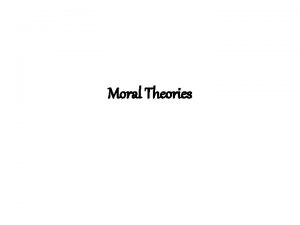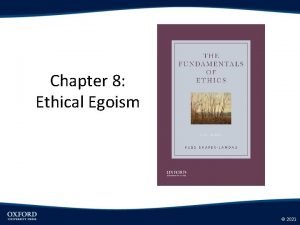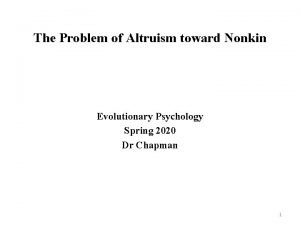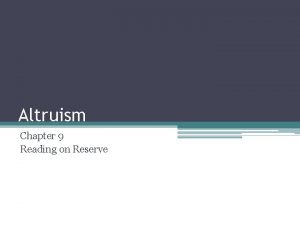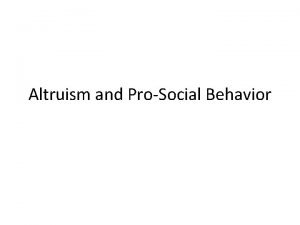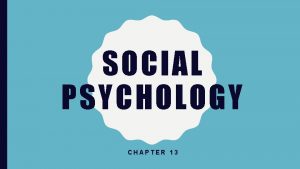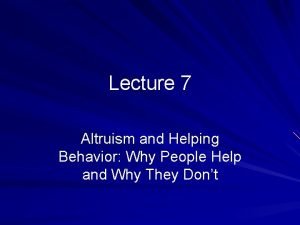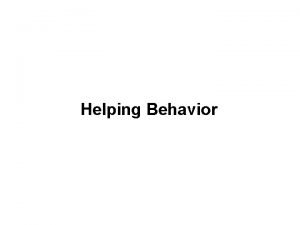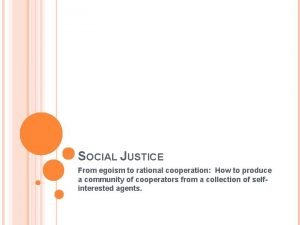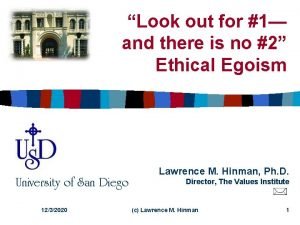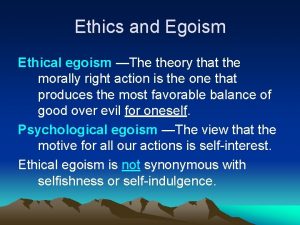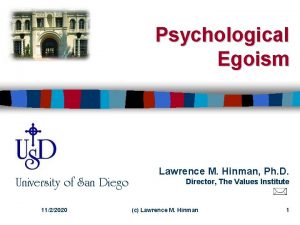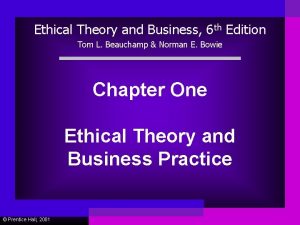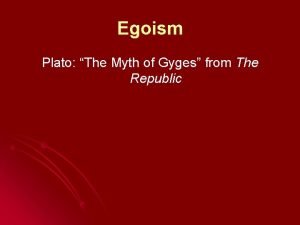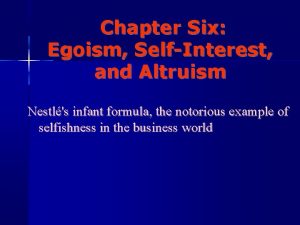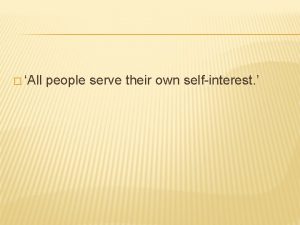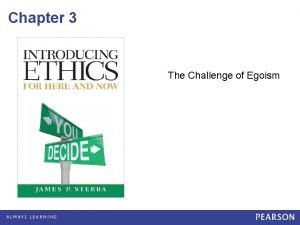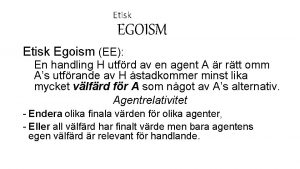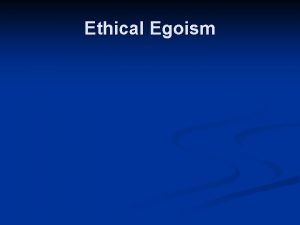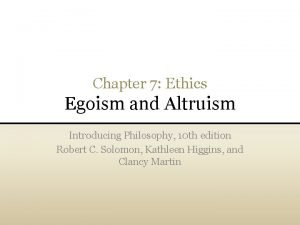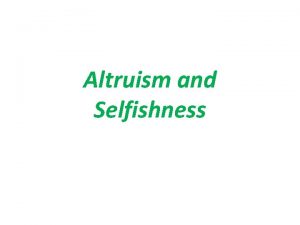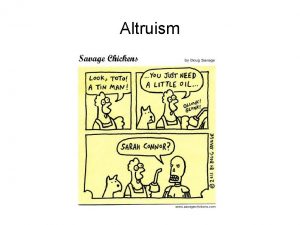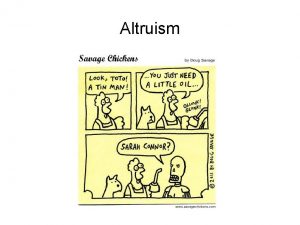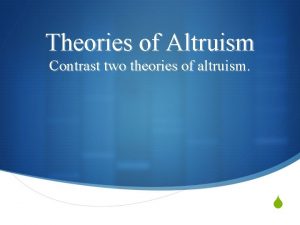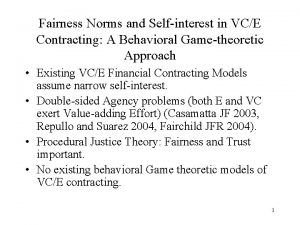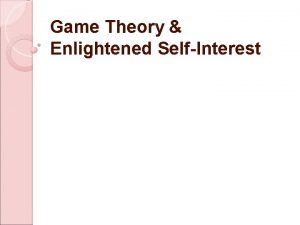Egoism SelfInterest and Altruism Egoism SelfInterest and Altruism































- Slides: 31

Egoism, Self-Interest, and Altruism

Egoism, Self-Interest, and Altruism Two Types of Egoism ◦ 1) Psychological Egoism ◦ 2) Ethical Egoism

Egoism, Self-Interest, and Altruism • The Argument from Self-Satisfaction • All people are egoist … • The Paradox of Hedonism • Follow our value system over satisfaction • The Argument from Self-Deception • Subconscious motives

Egoism, Self-Interest, and Altruism Ethical Egoism concerns itself with the best self-interest of the individual Ethical Egoism: Key Claims ◦ 1) The happiness of the individual is the greatest moral good ◦ 2) Happiness is achieved through the pursuit of rational selfinterest ◦ 3) One ought to pursue his/her own rational self-interest Ethical Egoism ◦ Rationally calculate that which is in our own self-interest,

Egoism, Self-Interest, and Altruism Ethical Egoism is not ◦ 1) Ethical Subjectivism ◦ 2) Hedonism 1) Ethical subjectivism ◦ According to Ethical Subjectivism we should only follow our feelings There are various elements of Ethical Egoism that can be found in other ethical theories

Egoism, Self-Interest, and Altruism 2) Hedonism ◦ According to theory of Hedonism, pleasure is the standard of value

Egoism, Self-Interest, and Altruism Epicurus (341 -270 BCE) Hedonism is concerned solely with immediate pleasures Ethical Egoism is concerned with both short and long-term consequences of one’s actions

Egoism, Self-Interest, and Altruism Thomas Hobbes: Thomas Hobbes (1588 -1679); English Philosopher Two Main Types of Egoism ◦ 1) Ethical Egoism, and ◦ 2) Psychological Egoism 1) Ethical Egoism ◦ Ethical Egoism is prescriptive (normative) ◦ It’s about how one/things ought to be 2) Psychological Egoism ◦ A descriptive theory

Egoism, Self-Interest, and Altruism Thomas Hobbes ◦ He presented an individualistic picture of human nature ◦ Humans are egoist ◦ Humans form societies out of a fear of death, for security, and in order to pursue their interest Human nature for Hobbes, or the Hobbesian State of Nature, is This is how one would live outside of a society

Egoism, Self-Interest, and Altruism According to Hobbes there is nothing noble about moral sentiments ◦ Sympathy/pity ◦ Altruism ◦ Is the Hobbesian View of Nature Correct? ◦ Edward Osborne Wilson (b. June 10, 1929) an American Biologist, Researcher, Sociobiologist ◦ He argues that we are like other animals

Egoism, Self-Interest, and Altruism The Limitations of Psychological Egoism ◦ Psychologist Egoist will not allow for any explanation that does not conform to their theory ◦ Every action is always explained in terms of egoism ◦ Scientific theory must be falsifiable

Egoism, Self-Interest, and Altruism What motivates people? ◦ It is even difficult to understand our own motives sometimes ◦ Psychologist Egoist claim that these particular cases are for self benefit

Egoism, Self-Interest, and Altruism Ayn Rand: Objectivist Ethics and Rational Ethical Egoism ◦ Ayn Rand (1905 -1982) An American Novelist, Screenwriter, and Philosopher ◦ She was born in St. Petersburg (Leningrad) Russia and Came to the U. S. in 1931 Ayn Rand believed that The United States… The Source of values is in Objective Reality only According to Ayn Rand, we value what helps us survive Self-Interest

Egoism, Self-Interest, and Altruism Ayn Rand: Objectivism She argues that it is reason that separates us from all other species Unlike Aristotle, Rand views humans as solitary

Egoism, Self-Interest, and Altruism Ayn Rand: Objectivism Each person, ideally, should live and work only for the self and never for the other ◦ This is known as an Atomistic Society ◦ This, according to Rand, is the Objectively Real World ◦ It is in this world that we can ◦ 1) Find our Real Happiness, and ◦ 2) Prove our Value

Egoism, Self-Interest, and Altruism Ayn Rand: Objectivism According to Ayn Rand, Rational Virtues counsels us to ◦ 1) Be Independent ◦ 2) Have Integrity ◦ 3) Be Honest ◦ 4) Be Just

Egoism, Self-Interest, and Altruism Ayn Rand: Objectivism All rational people will accept this list of virtues Productive Work is the Supreme value and Altruism is immoral ◦ She calls the Altruist a “Second-Hander” and it’s suicidal Ethical Egoist also reject federal bailouts

Ayn Rand, Ethical Egoism, and Laissez-Faire Capitalism Ethical Egoism and Laissez-Faire Capitalism ◦ The Individual is the fundamental unit of economic activity, and ◦ The law of Supply and Demand is natural to human activity ◦ These two premises led her to the thought that Laissez-Faire Capitalism is both ◦ The Natural, and ◦ The Best economic system

Ayn Rand, Ethical Egoism, and Laissez-Faire Capitalism Ethical Egoism and Laissez-Faire Capitalism ◦ According to Ayn Rand the individual is the fundamental unit of economic activity, and ◦ The law of Supply and Demand is natural to human activity Laissez-Faire Capitalism is ◦ An Economic System ◦ It is based on,

Ayn Rand, Ethical Egoism, and Laissez-Faire Capitalism and a Free-Market Economy ◦ Adam Smith (1723 -1790) A Scottish Economist and Moral Philosopher ◦ He laid out the foundations of Laissez-Faire Capitalism in the Wealth of Nations (p. 1776) ◦ In the best society the individual has the freedom to pursue his/her one self-interest in the marketplace

Ayn Rand, Ethical Egoism, and Laissez-Faire Capitalism In Laissez-Faire Capitalism ◦ According to Smith ◦ Individuals (consumers) are free to spend in any way that brings them the most satisfaction ◦ The Capitalists create jobs for workers ◦ They do this by

Ayn Rand, Ethical Egoism, and Laissez-Faire Capitalism Ayn Rand ◦ Theorizes that individuals don’t always act in prudent and rationally self-interested ways Capitalism has produced a immense amount of wealth and technological advances

Ayn Rand, Ethical Egoism, and Laissez-Faire Capitalism Karl Marx (1818 – 1883) German Philosopher and Economist Marxist Analysis of Laissez-Faire Capitalism ◦ Like the capitalist, Karl Marx agreed that people can find fulfillment in productive work, but ◦ Like Aristotle, he believed that people are primarily socially productive beings ◦ Therefore, for Marx, the Egoism of Capitalism was a great evil The Marxist Claim ◦ Capitalism benefits only a few at the expense of the many, and ◦ Ethical Egoism, contrary to Ayn Rand, is not Humans qua Humans but rather it is a philosophy of the elite

Ayn Rand, Ethical Egoism, and Laissez-Faire Capitalism The Globalization of Capitalism ◦ Ethical Egoist ◦ Global Capitalism will ◦ Benefit both rich and poor nations ◦ Capital and trade will flow from the richer nations to the poorer nations and back ◦ They believe that the wealth generated will trickle down from the richer nations to the poorer nations ◦ Allowing the poorer nations to compete on the world market

Ayn Rand, Ethical Egoism, and Laissez-Faire Capitalism Liberation Ethicist ◦ Capitalism is Immoral ◦ Exploitive, and ◦ A form if Institutionalized Violence Marxist and Liberation Ethicist ◦ The Inherent Laissez-Faire Capitalism of Ethical Egoism doesn’t consider or truly express the dignity and integrity of each individual

Ethical Egoism and the Moral Community Egoism, Self-Esteem and Moral Development ◦ Developmental psychology tells is that most children are egoist and that for the most part their actions are motivated by self-interest ◦ Ayn Rand quotes ◦ “To love is to value” ◦ “Only a rationally selfish man, a man of self-esteem, is capable of love” ◦ “The man who does not value himself, cannot value anything or anyone. ” ◦ The Virtue of Selfishness page 35

Ethical Egoism and the Moral Community The Moral Community of Ethical Egoist ◦ The self, and ◦ Those who can benefit the self

Arguments Against Ethical Egoism 1) The Inconsistent Outcomes Argument ◦ Brian Medlin: (1927 -2004) was the Foundation Professor of Philosophy at Flinders University (in Australia) ◦ Ethical Egoism fails because it doesn’t bring a guide to action ◦ His Argument: ◦ 1) Moral principles must be universal and categorical ◦ 2) I must universalize my egoist desire to out on top over Tom, Dick, and Harry ◦ 3) But I must also prescribe Tom’s egoist desire to come out on top over Dick, Harry, and Me (and so on) ◦ 4) Therefore, I have prescribed incompatible outcomes and have not provided a way of adjudicating conflicts of desire. In effect, I have said nothing.

Arguments Against Ethical Egoism 2) The Publicity Argument 3) Friendship and the Paradox of Ethical Egoism ◦ Friends can’t always be preoccupied with their own self-interest ◦ An Ethical Egoist must give up egoism to reach the goal of egoism – The Paradox of Ethical Egoism 4) The Argument from Counterintuitive Consequences ◦ Ethical Egoism demands that I do not help others is there is nothing for me to gain

Arguments Against Ethical Egoism 5) The Problem of Future Generations

Ethical Egoism The End
 Egoism ethics
Egoism ethics Ethical egoism vs psychological egoism
Ethical egoism vs psychological egoism Reciprocal altruism theory
Reciprocal altruism theory Pure altruism
Pure altruism Warm glow altruism
Warm glow altruism Altruism theory
Altruism theory Altruism theory
Altruism theory Conclusion of gifted child
Conclusion of gifted child What types of love
What types of love Altruism molly peacock
Altruism molly peacock Deindividuation psychology definition
Deindividuation psychology definition Polarization psychology
Polarization psychology Sociobiology definition
Sociobiology definition What is altruism
What is altruism Empathy altruism
Empathy altruism Rational egoism
Rational egoism Psychological egoism
Psychological egoism Nietzsche egoism
Nietzsche egoism Ayn rand ethical egoism
Ayn rand ethical egoism Egoism
Egoism Psychological egoism examples
Psychological egoism examples Ethical egoism definition
Ethical egoism definition Red pink yellow purple green and blue song
Red pink yellow purple green and blue song Willaim blake
Willaim blake Comparison chart romeo and juliet vs. west side story
Comparison chart romeo and juliet vs. west side story Taller and younger older and shorter
Taller and younger older and shorter How to write 50 centavos
How to write 50 centavos Blue red orange blue green red
Blue red orange blue green red Gabby and sydney bought some pens
Gabby and sydney bought some pens Young and dyslexic language and structure
Young and dyslexic language and structure Compare and contrast maynard jackson and andrew young
Compare and contrast maynard jackson and andrew young West yorkshire and harrogate health and care partnership
West yorkshire and harrogate health and care partnership
